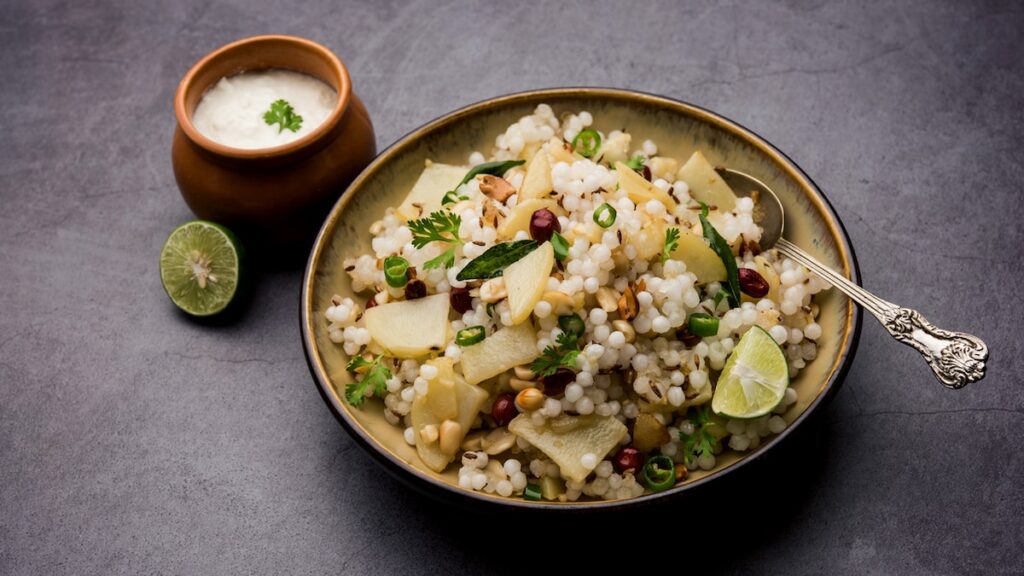Fasting On Navratri? These Tips Will Make Sure Your Nine Days Are A Breeze

Sharad Navratri 2024 is just around the corner, and if you are planning to observe fasts, then you are not alone! Whether you fast for religious reasons or just for detox, Navratri seems like a great blend of devotion and discipline. Every year, Sharad Navratri comes during the autumn season and marks the beginning of a festive season in India. As we gear up to fast for the next nine days, it is important to fast wisely and in the right way. How is that possible? Well, if you keep certain tips in mind. Read on to learn how you can make your Navratri fasting a breeze and more fulfilling.
Also Read: Navratri Special Thali: How To Make A Delicious Navratri Thali At Home
Photo: iStock
Here Are Three Fasting Tips To Keep In Mind During Navratri:
As per nutritionist Urvi Gohil, you can keep yourself healthy during Navratri fasting if you keep these tips in mind.
1. Do Not Overeat
Fasting doesn’t give you a free pass to overindulge once you break it. As per the expert, it is important to listen to your body and avoid overeating during your meals. Eating too much can make you feel bloated and lethargic, something you don’t want during your fasting days. Stick to portion control and listen to your body. Eat mindfully and eat nutritious foods which are light and will keep you full and satisfied.
2. Limit Your Caffeine And Salty Foods Intake
While it might seem tempting to sip on endless cups of tea and enjoy salted snacks, resist the urge. The expert shares that too much caffeine and salty foods can cause dehydration, which can make you more sluggish and tired than usual. Plus, salty snacks like namkeen and chips can disrupt your digestive system, especially while fasting. So, swap your desired foods with nutritious choices like fresh fruits, roasted makhanas, etc.
3. Stay Well Hydrated
Hydration is your best friend during Navratri fasting. The best part is that it is not about just drinking water, but you can keep your hydration levels up by adding flavour. As per the expert, you can have a variety of options like coconut water, fresh fruit juices, or even a refreshing glass of mint chaas. You could even try ajwain or jeera water to aid digestion and keep bloating at bay. Staying hydrated won’t just keep you energized but also help flush out toxins from your body.
Watch the full video below:
What All Can You Eat During Navratri Fasting?
Now that you know how to fast in a healthy way during your Navratri fast, let’s check out which things can you include in your diet during that time.
1. Flours and Grains
While you can’t have wheat and rice during Navratri, there are some other nutritious options to keep you full. You can have alternatives like Kuttu ka Atta (buckwheat flour), Singhare ka Atta (water chestnut flour), Rajgira ka Atta (amaranth flour), Samai ke Chawal (barnyard millet) or even sabudana. Dishes prepared with these ingredients will keep you full and happy for long.
2. Fruits
You can eat fruits and dry fruits during Navratri. Indulge into seasonal delights individually or make a quick fruit chaat. You can also enjoy these fruits with a bowl of yoghurt.
3. Spices
Refrain from using normal table salt and use sendha namak instead. Sendha namak is a highly crystalline salt which is made by evaporating seawater and doesn’t contain high amounts of sodium chloride. You can also use other spices but a lot of it depends on your religious beliefs.

Photo: iStock
4. Vegetables
Some vegetables that you can consume during Navratri fasting are potatoes, sweet potato, arbi, kachalu, yam, lemons, and raw pumpkin. Tomatoes, spinach, bottle gourd, and cucumber can also be consumed.
5. Milk Products
You can consume milk and milk products during fasting like curd. This can also keep your gut healthy and cool. Other items include paneer, white butter, ghee, malai, and preparations with milk and khoya.
Also Read:Craving Sweets During Vrat? Here Are 8 Desserts You Can Make For Navratri
Disclaimer: This content including advice provides generic information only. It is in no way a substitute for qualified medical opinion. Always consult a specialist or your doctor for more information. NDTV does not claim responsibility for this information.








